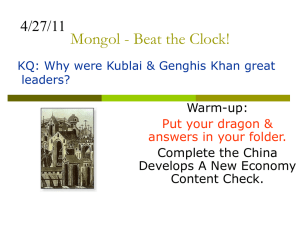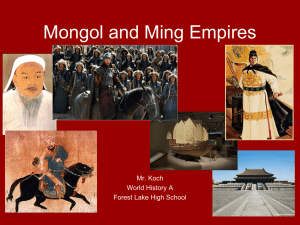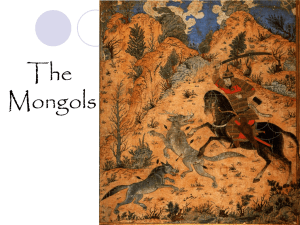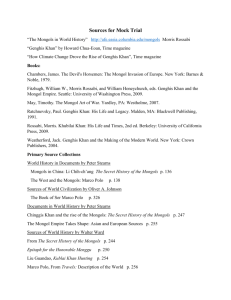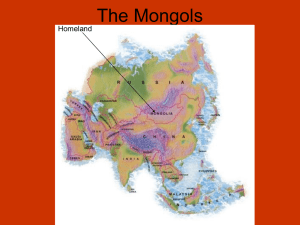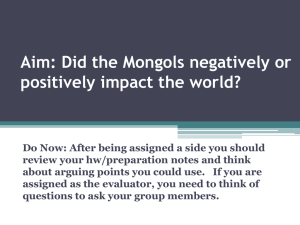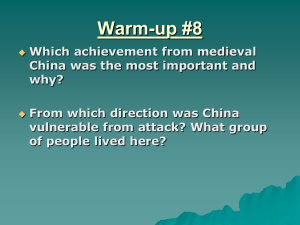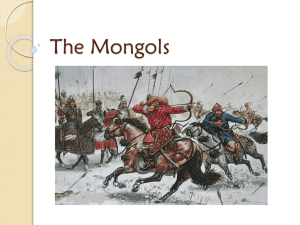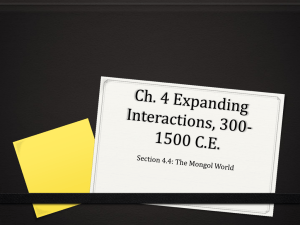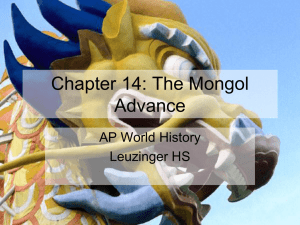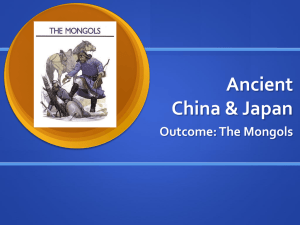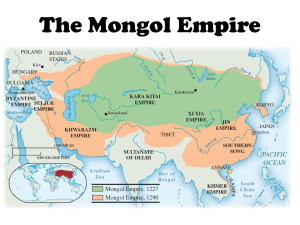Mongolian Empire
advertisement
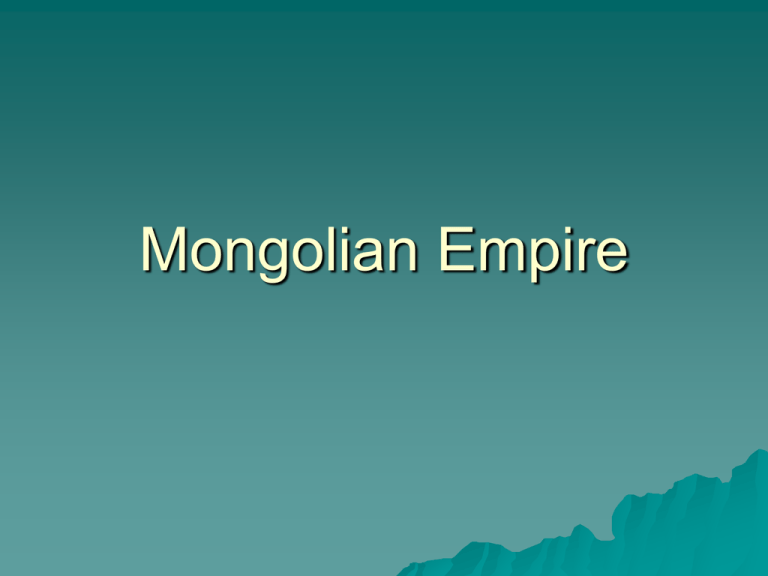
Mongolian Empire I. Mongols A. Mongols lived in an area North of China B. Nomadic tribe that raised cattle, goats, sheep, and horses C. Followed their herd of animals through the steppes (grassy plains) of Mongolia. D. Skilled on horseback and learned as early as age 4 E. Skilled in combat/warfare 1. Fire arrows and spears at their enemies at a distance on horseback II. Genghis Khan A. Temujin was born in the 1160s B. He began to unite the many Mongol tribes at a very young age C. Temujin was elected “strong ruler” or Genghis Khan over the Mongol tribes in 1206. D. Genghis Khan’s main goal was to conquer lands beyond Mongolia III. Building an Empire A. Genghis Khan gathers an army of over 100,000. B. Divided his army into smaller divisions C. Commanding officers were chosen based on ability and not by family ties or birth D. Genghis Khan started conquering the tribes within the steppes. 1. Increased the wealth of the Mongols and brought new soldiers to his skilled army E. In 1211, the Mongols would attack and conquer Northern China F. Mongols were known for using terrorist tactics to scare people into surrender 1. Burned cities, robbed, tortured, and killed hundreds of thousands of people. G. Genghis Khan would die in 1227, when he fell from his horse. The empire building would continue under the leadership of his four sons IV. Mongolian Empire A. After Genghis Khan’s death, the Mongols would conquer land in eastern and central Europe, southeast Asia, and the Middle East B. Mongols would unite their territories under one rule. C. The largest land empire the world has ever known stretched from the Pacific Ocean to Eastern Europe D. Mongols would bring peace to lands they conquered E. Mongols would become wealthy by taxing goods traded on Asian trade routes (Silk Road) F. From conquering China, the Mongols would also adapt gunpowder for their own use of terror. V. Kublai Khan A. Genghis Khan’s grandson, Kublai, became Khan in 1260. B. Starting in 1271, he would begin the ten year process of conquering all of China C. He would establish the Mongolian capital in Khanbaliq, which is where the modern city of Beijing is located D. Kublai Khan would make himself emperor of China and establish the Yuan Dynasty (“beginning”). E. Using the Silk Road and under Mongol rule, China would become very powerful and wealthy. F. A European traveler, Marco Polo, would reach China and Kublai Khan was fascinated with his stories. 1. After 16 years of working with Kublai Khan, Polo would return to Europe and write a book about his experience in China. 2. The book would become a best seller in Europe, enticing many Europeans to travel to Asia G. Kublai Khan would take control of Korea because the Koryo, or rulers of Korea, accepted Mongol rule. H. Mongols would force thousands of Koreans to build ships for their next conquest, Japan VI. Japan A. With the warships the Koreans built, the Mongols would launch two separate invasions of the island of Japan (1274 and 1281). B. Each invasion was a failure because of violent Pacific storms known as typhoons that destroyed Mongol warships. C. The Japanese would name the typhoons “kamikazes,” which means “divine wind.” D. The Japanese would continue to be an isolated community where a feudal system thrived until the 1800s. VII. China and Korea rebel A. Kublai Khan would die in 1294 and a series of weak rulers that followed weakened the empire. B. In 1368, a series of rebellions led by Zhu Yuanzhang drove the Mongols out of China. 1. Zhu would become emperor establishing the Ming Dynasty. C. As the Mongols lost power, the Koreans would also regain their sovereignty D. China and Korea would become united countries because of Mongol rule.
